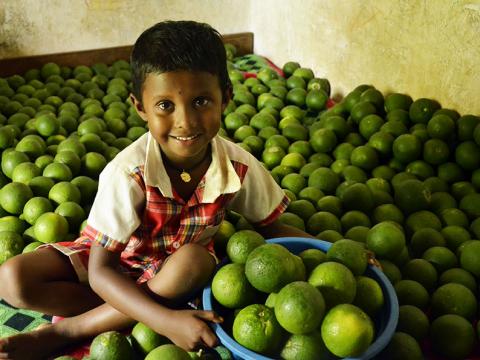An income all year round…

Freshly plucked green oranges carpet the front room in Sumanadasa’s (46) house. This is just a part of his harvest for the month. His garden is a mosaic of cultivations.
“My garden was never like this,” smiles Sumanadasa, “We never used to cultivate the land around our house. It was just over-grown with weeds and bushes.”
Like everyone in his village Sumanadasa knew only slash-and-burn cultivation for a living. They cleared forests and cultivated for six months. The next six months they had to manage with the income they received from the harvest or go for low paying daily labour work to feed their families.
“Slash and burn cultivation was a lot of hard work,” says Sumanadasa, “You have to cut down the trees, set fire to them and make space for the cultivation. After cultivation until harvest we spend day and night protecting it from wild animals that come and destroy the crops.”
"World Vision introduced us to home-gardening and new agriculture methods."
Then the land was taken in by the Forest Reserves and they had no land to cultivate anymore.
“That is when World Vision introduced us to home-gardening and new agriculture methods,” says the farmer, “We had no proper system of cultivation before, but the programme taught us from methods of planting that saved a lot of space to soil and water conservation, compost making and many other techniques.”
“Today I have a variety of long and short term crops that give me a harvest every month. What I earned cultivating 4 acres for six months I receive from quarter of an acre within a month. We will never have to go back to cutting down forests again,” he smiles.
Sumanadasa grows a variety of fruits and other crops now. He also grows different cereal crops every season. He no longer buys vegetables from the market to feed his family. Everything is garden fresh.
“We cultivate chili for exporting too. World Vision has linked us with Hayleys for this,” he says.
“I have a stable income now and I don’t fear about my children’s future anymore. I can well provide for their education and other needs,” he adds.
Sumanadasa is also a farmer leader in his area, sharing his agriculture knowledge with other farmers in his village.
